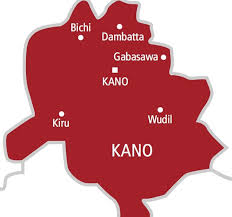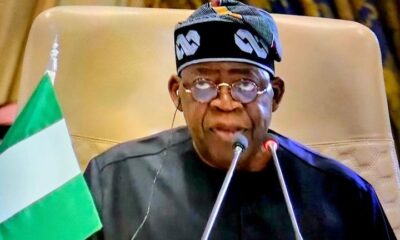NEWS
Things to know about ‘mysterious objects’ shot down by US
The downing of a huge Chinese balloon off the US coast, followed by the shootdowns of three smaller objects over Alaska, Canada and Lake Huron on the US-Canada border has raised concerns about North American security and further strained relations with China.
Here is what we know so far:
– What were the four objects? –
The drama began in late January when a giant Chinese balloon – dubbed a spy craft by American officials – drifted for days through US skies before being shot down on February 4 by an F-22 jet off the South Carolina coast. China insisted the balloon was conducting weather research and had gone astray.
The Pentagon said it had a gondola the size of three buses and was equipped with multiple antennas and had solar panels large enough to power several intelligence-gathering sensors.
It also appeared to be able to steer itself, using winds and possibly a propulsion mechanism, officials said.
Then Friday, US fighter jets downed another object off northern Alaska. It was much smaller than the Chinese balloon, and lacked any system of propulsion or control, officials said.
On Saturday, a US F-22 jet, acting on US and Canadian orders, downed a “high-altitude airborne object” over Canada’s far northwest Yukon territory, saying it posed a threat to civilian flight. Canada described it as cylindrical like and about the size of a Volkswagen Beetle.
On Sunday Biden ordered US warplanes to down yet another unidentified object over Lake Huron. The object was described as an octagonal structure with strings hanging off it.
It too posed a hazard to civil aviation as it flew at about 20,000 feet (6,000 meters), officials said.
The Pentagon said none of the four objects appeared armed or posed any threat of attack.
Officials would not comment on the origin or function of the three objects that came after the Chinese balloon. Only the balloon has been attributed to Beijing so far.
– What has been recovered? –
Military teams working from planes, boats and minisubs are scouring the shallow waters off South Carolina for the first object, and military images showed the recovery of a large piece of balloon. The Federal Bureau of Investigation is taking custody of the debris for analysis.
Operations to recover the second object continue on sea ice near Deadhorse, Alaska. “Arctic weather conditions, including wind chill, snow and limited daylight, are a factor,” the military said.
Recovery teams are searching for debris from the third object in the Yukon, Canadian Defense Minister Anita Anand said Saturday.
The Pentagon said Sunday that US and Canadian teams were preparing an operation to try and recover the fourth object.
– What was the objects’ purpose? –
US officials say the Chinese balloon, which flew over sensitive US nuclear missile sites, had surveillance equipment that could intercept telecommunications.
They said that such balloons skirted US territory at least four times in the past six years, but none had flown deep into US territory.
The balloons were part of a “fleet” operated by China — likely the Chinese military — that has conducted surveillance on some 40 countries over five continents, US officials said.
Speculation was growing about the other objects. US Assistant Secretary of Defense Melissa Dalton said it was known that public and private research bodies launch their own research craft into the atmosphere at those altitudes.
But after decades of investigating some strange sightings by US military pilots that were categorized as “UFOs”, officials were not ready to completely dismiss the idea that aliens or extraterrestrials were the source.
“I haven’t ruled out anything at this point,” said US Northern Command Commander General Glen VanHerck Sunday when asked about that possibility.
– Why so many objects now? –
Dalton said Sunday that after the Chinese balloon was detected, US air defense made adjustments to radar systems to be able to detect smaller and slower-moving objects in the atmosphere.
Analysts said normally US and Canadian intelligence constantly receive huge amounts of raw data, and generally screened some out to focus on the threat of incoming missiles, not slow-moving objects like balloons.
After the radar adjustments, “What we are seeing is very, very small objects that produce a very, very low radar cross section,” said VanHerck.
– What’s the impact on US-China ties? –
The United States scrapped a visit to China by Secretary of State Antony Blinken, intended to stabilize severely strained relations, and has sanctioned six Chinese entities believed to support military spy balloon programs.
Beijing denounced the first balloon’s downing, saying it “seriously violated international practice.” It reserved the right “to use necessary means to deal with similar situations.”
Dalton said Sunday that after Beijing rejected US overtures for several days, US officials have had “contacts” with China over the balloon. She did not characterize the contacts.
AFP
NEWS
Kano Police Warn Residents Of Imminent Terror Attack Threats

The Kano State Police Command has warned residents of a potential terror attack, targeting public gatherings in strategic locations across the state.
In a statement issued on Friday, the command’s Public Relations Officer, SP Abdullahi Haruna, disclosed that intelligence reports indicated suspected terrorists were planning to carry out attacks.
“The Kano State Police Command, in liaison with other security agencies, has received intelligence reports of suspected terrorists planning to launch attacks on public gatherings in strategic locations within Kano State.
READ MORE: Savannah Energy Provides Unaudited FY 2024 Trading Updates
“In response, we hereby urge residents to exercise caution and avoid crowded places and environments until further notice as a preventive measure to enable security operatives to identify and dislodge possible attackers,” the statement read.
To address the threat, the police command has enhanced security arrangements across the state. SP Haruna revealed that specialized units, including the Explosive Ordinance Disposal (EOD) and the Chemical, Biological, Radiological, and Nuclear (CBRN) teams, have been deployed to strategic locations and are on high alert.
“A team of experts from the command’s Explosive Ordinance Disposal, Chemical, Biological, Radiological, and Nuclear units have been deployed to strategic locations and are on high alert.
“The unit can be contacted through: 08169884988 or 07067157218 for report of suspicious persons or item(s),” Haruna stated.
Residents have been urged to remain vigilant and report any suspicious activities to the nearest police station or contact the command through the designated hotlines.
“The command remains committed to protecting lives and properties as well as maintaining law and order in Kano State.
“We appreciate the support and cooperation of the good people of Kano State and urge everyone to remain vigilant. Your vigilance and cooperation are crucial in ensuring public safety,” the statement concluded.
NEWS
Ifon-Ilobu-Erin Osun Land Disputes: Osun Constitutes A 100-Member Boundary Resolution Committee

In the bid to resolve the incessant land disputes between the communities of Ifon, Ilobu and Erin Osun, the Governor of Osun State, Senator Ademola Adeleke has constituted an enlarged 100-member high powered land crisis resolution committee in which each of the affected communities has 25 representatives, and the state government represented by 25 members.
The Osun State Commissioner for Information and Public Enlightenment, Oluomo Kolapo Alimi made the disclosure in a statement in Osogbo, on Friday.
He revealed that the Ataoja of Osogbo land, Oba Jimoh Adetunji Olanipekun Larooye is the Chairman of the Committee, while a retired judge of Osun State Judiciary and Chairman, Osun State Boundary Commission, Justice Moshood Adekunle Adeigbe, would serve as the Co-Chairman.
According to Alimi, Gov Adeleke put in place the Committee with a view to bringing a lasting end to the incessant land disputes among the three affected communities.
ALSO READ: Leadership Newspaper Backs Adeleke For Second Tenure, Names Him ‘Gov Of The Year’
It was gleaned from the statement that there were four other traditional rulers on the panel, including His Royal Majesty; Oba Abioye Oyebode, the Olokuku of Okuku, His Royal Majesty; Oba Adams Iyiola Bamidele Yusuf, the Oloba of Oba Oke, His Royal Majesty; Oba Adekeye Oyedare, the Oloyan of Oyan and His Royal Majesty, Oba Akeem Ogungbamgbe,The Owaloko of Iloko-Ijesha.
Other members are Umar Abba Mohammed, Osun State Commissioner of Police, Ayoola Kehinde, Osun State Director, Department of State Services( DSS) Brigadier General, Aliu Mohammed, Commander E.C.C, Ede, Sotiyobo Igbalawola, Osun State Commander, Nigeria Security and Civil Defence Corps( NSCDC), Anthony Chikezie, Commander, Immigration Service, Osun State, Adekunle Omoyele, Osun State Commander, Amotekun Corps, and Special Adviser to Osun State Governor on Security, Barrister Dare Ojo.
Also on the enlarged Committee, where members are enjoined by Gov Adeleke to bring in their wealth of experience to bear on the highly critical assignment, are the Chairman, NBA Osogbo branch, Yemi Abiona, Esq; the Chairman, NBA, Ikirun, Niyi Akinsola, Esq; the Chairman, NBA, Ile Ife, Tope Olajoko, Esq; the Chairman, NBA, Ilesha, Raymond Oki, Esq; Others appointed to serve on the Ifon- Ilobu- Erin Osun Peace Resolution Committee are; Soladoye Abioye, the Surveyor General of Osun State – Dr Sodiq Olohunde, Office of Chief of Staff to the Governor, Marufat Adekemi Bello, Permanent Secretary , Ministry of Justice – Femi Ogundun,- Permanent Secretary, Ministry of Local Govt and Chiertincy Affairs, Dr Fritz Mobolaji Olaoye, Permanent Secretary, Ministry of Lands and Physical Planning.
Completing the list of the Committee members are Comrade Wasiu Ajadosu, Osun NUJ Council Chairman, Comrade Waheed Lawal, Osun Civil Society Coalition and Comrade Saka Mao, a Public Affairs Analyst
The statement has it that Gov Adeleke, will on Tuesday, the 28th of January, 2025 perform the swearing in ceremony of the 100-member enlarged Ifon, Ilobu, Erin Osun Land Crisis Resolution Committee, at the Multi purpose hall of Local Government Service Commission, State Government Secretariat, Abere Osogbo by 11:00am.
NEWS
Okpebholo Moves To End Indiscriminate Parking, Gridlock In Edo State

Edo State Governor, Senator Monday Okpebholo, has charged the Managing Director of the Edo State Traffic Control Management Agency (EDSTMA), Engr. Stainless Ijeghede on indiscriminate parking and traffic gridlock, especially in market areas.
According to a statement in Benin City on Friday, by Chief Press Secretary to Edo State Governor, Fred Itua, his principal gave the charge while decorating Ijeghede with his new rank as the head of EDSTMA.
He noted that while addressing the new Managing Director and his personnel at the Exco Chambers in Government House, Gov Okpebholo pointed out that the agency should do its job well by ensuring free flow of traffic across the state.
He called on Ijeghede and men of the agency to ensure they checked indiscriminate parking of vehicles and buses, especially in market areas.
“Edo State belongs to all of us and whatever we are doing, we should do it with care not to harm anybody. I appeal to EDSTMA to ensure that the city is well kept because whenever I drive round town, I see vehicles everywhere as the city is not well kept.
“This is your primary assignment. You should ensure the city is well kept as vehicles park indiscriminately and they are causing obstruction. Traffic is not flowing as it should and it is causing serious gridlock. Is it that you are not doing your job well?
ALSO READ: Leadership Newspaper Backs Adeleke For Second Tenure, Names Him ‘Gov Of The Year’
“Is it that you are not doing your job well or because you have a new leader that is why traffic is not flowing, or because you don’t know your job?
“You people should wake up and keep the state clean. Make sure that vehicles are parked well especially in the market areas. Monitor markets very well as these areas are looking really unkempt with vehicles and buses parked indiscriminately, causing traffic gridlock. Edo people are worst hit. They suffer from this. Ensure free flow of traffic so that the people will be happy,” Governor Okpebholo emphasized.
The EDSTMA boss, thanked Gov Okpebholo for the opportunity to serve the people of Edo State and assured him of the loyalty of the agency.
He added that his men will do their job professionally and ensure that the is free flow of traffic across the state.





















